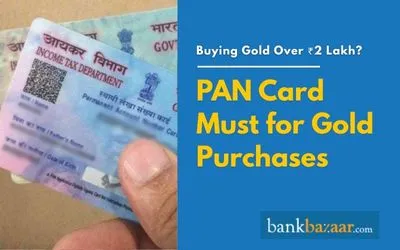PAN Card Mandatory to Buy Gold Worth Rs.2 Lakh or More
A Permanent Account Number or PAN is a unique 10-digit alphanumeric code used by the Income Tax Department to identify individuals who are earning. PAN is mandatory for anyone who falls under the tax slab. For certain transactions, a PAN card was made compulsory by the Government of India.
PAN Card Requirements
For various financial transactions, PAN was made essential in order to curb the flow of black money and widen the taxpayer base. PAN was made mandatory under Rule 114B for the following transactions:
- Purchase and sale of immovable property exceeding Rs.10 lakh. This was previously Rs.5 lakh.
- Purchase and sale of four wheelers.
- Life Insurance Premiums exceeding Rs.50,000 per year
- Fixed deposits held at any bank exceeding Rs.50,000 or Rs.5 lakh in a year .
- Opening an account with any bank except Pradhan Mantri Dhan Yojana accounts.
- Cash payments related to foreign travel and currency exchange exceeding Rs.50,000.
- One-time hotel bill payments of Rs.50,000 or more paid with cash.
- Cash purchase of bank drafts, pay orders or banker's cheques above Rs.50,000 per day.
- Cash deposit in any bank account of Rs.50,000 or more in a single day.
- Applying for a credit card.
- Purchase of bonds or mutual funds above Rs.50,000.
- Opening demat accounts.
- Purchase of gold jewellery or bullion worth Rs.2 lakh or more by cash or card.
PAN Card Requirements for Gold Purchase

Furnishing PAN card details for gold purchase was made mandatory by the Government of India for transactions valued at Rs.2 lakh and above. The rule impacted the organised jewellery trade affecting more than 50% of businesses in terms of value. Prior to 1 January 2016, PAN details were required only for purchase of Rs.5 lakh and above. Jewellers complained that customers who did not have a PAN card faced hardships in purchasing gold. Along with people who did not have PAN cards, those who did want to share PAN details sought out unorganised retailers to buy jewellery without bills. Important things to note regarding PAN details for gold purchase are as follows:
- If you are buying gold worth Rs.2 lakh and above, you need to provide your Permanent Account Number.
- PAN will be traded as the buyer's identity.
- Sellers must collect tax at source on such sales which will be different from Tax Deducted at Source.
- The tax rate is specified and must be collected and deposited with the Government.
- Furnishing PAN details does not mean you have to pay tax. It is merely a means of establishing financial identity.
Gold Purchases and Demonetisation
With the demonetisation of Rs.500 and Rs.1,000 notes coming into effect from 9 November 2016, customers retreated from gold purchases fearing scrutiny from the IT Department. On 8 November, after the announcement was made, there was a momentary gold rush as people sought out gold to dump their black money. But afterwards, jewellers and retailers saw empty stores at the peak of the wedding season. The demonetisation scheme was implemented to curb black money and counterfeit notes in circulation. To avoid PAN regulations, customers paid stores extra to divide the purchase into separate bills of smaller amounts not amounting to Rs.2 lakh. The government brought jewellers under surveillance to ensure that no excessive gold sales were made with black money.
The demonetisation scheme caused a severe cash crunch in the Indian economy as ATMs and banks faced a shortage of new notes. Demand for gold slowly picked up but might take months to normalise.
Read More on Gold
FAQs on PAN Card Mandatory to Buy Gold
- Is a PAN card required for the sale or purchase of immovable property?
Yes. A PAN card is a mandatory document required for the sale or purchase of immovable property.
- Is a PAN card mandatory to buy Gold?
A PAN card is mandatory for gold purchases worth Rs.2 lakh and more.
- How much gold can be purchased in cash?
Jewellery up to Rs.2 lakh can be purchased in cash.
- How can I avoid paying tax on my gold purchase?
To avoid paying tax, you can claim a tax exemption on long-term capital gains from the sale of gold assets under Section 54F of the IT Act, 1961.
- Is KYC mandatory while buying gold?
As part of India's commitment to the Financial Action Task Force (FATF), cash transactions above Rs 10 lakh to purchase gold will be required to complete his/her Know Your Customer (KYC). PAN card and Aadhaar card are valid documents for the mandatory KYC.
- How much gold is not taxed in India?
A married woman can have up to 500 grams of gold. An unmarried woman can have up to 250 grams of gold.

Disclaimer
Credit Card:
Credit Score:
Personal Loan:
Home Loan:
Fixed Deposit:
Copyright © 2026 BankBazaar.com.